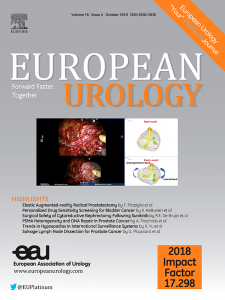FGFR Inhibition in Urothelial Carcinoma
IF 25.3
1区 医学
Q1 UROLOGY & NEPHROLOGY
引用次数: 0
Abstract
Background and objective
The 2024 US Food and Drug Administration approval of erdafitinib for the treatment of metastatic urothelial carcinoma (mUC) with FGFR3 alterations ushered in the era of targeted therapy for bladder cancer. In this review, we summarize the effects of FGFR pathway alterations in oncogenesis, clinical data supporting FGFR inhibitors in the management of bladder cancer, and the challenges that remain.
Methods
Original articles relevant to FGFR inhibitors in urothelial cancer between 1995 and 2024 were systematically identified in the PubMed and MEDLINE databases using the search terms “FGFR” and “bladder cancer”. An international expert panel with extensive experience in FGFR inhibitor treatment was convened to synthesize a collaborative narrative review.
Key findings and limitations
Somatic FGFR3 alterations are found in up to 70% of low-grade non–muscle-invasive bladder cancers; these activate downstream signaling cascades and culminate in cellular proliferation. Beyond a link to lower-grade/lower-stage tumors, there is little consistency regarding whether these alterations confer prognostic risks for cancer recurrence or progression. FGFR3-altered tumors have been linked to a non-inflamed tumor microenvironment, but paradoxically do not seem to impact the response to systemic immunotherapy. Several pan-FGFR inhibitors have been investigated in mUC. With the introduction of novel intravesical drug delivery systems, FGFR inhibitors are poised to transform the therapeutic landscape for early-stage UC.
Conclusions and clinical implications
With deepening understanding of the biology of bladder cancer, novel diagnostics, and improved drug delivery methods, we posit that FGFR inhibition will lead the way in advancing precision treatment of bladder cancer.
表皮生长因子受体抑制剂在尿道癌中的应用
背景和目的:2024年,美国食品药品管理局批准厄达非替尼用于治疗FGFR3改变的转移性尿路上皮癌(mUC),开创了膀胱癌靶向治疗的时代。在这篇综述中,我们总结了FGFR通路改变对肿瘤发生的影响、支持FGFR抑制剂治疗膀胱癌的临床数据以及仍然存在的挑战:方法:使用 "FGFR "和 "膀胱癌 "为检索词,在 PubMed 和 MEDLINE 数据库中系统地查找了 1995 年至 2024 年间与 FGFR 抑制剂治疗尿路癌相关的原创文章。我们召集了一个在表皮生长因子受体抑制剂治疗方面具有丰富经验的国际专家小组,共同撰写了一篇叙述性综述:在多达 70% 的低级别非肌浸润性膀胱癌中发现了体细胞生长因子受体 3 改变;这些改变激活了下游信号级联,并最终导致细胞增殖。除了与低分级/低分期肿瘤有关外,关于这些改变是否会导致癌症复发或进展的预后风险,目前还没有一致的结论。FGFR3改变的肿瘤与非炎症性肿瘤微环境有关,但矛盾的是,它似乎并不影响对全身免疫疗法的反应。目前已对几种泛FGFR抑制剂进行了研究。随着新型膀胱内给药系统的推出,FGFR抑制剂有望改变早期UC的治疗格局:随着对膀胱癌生物学、新型诊断方法和改进的给药方法的深入了解,我们认为表皮生长因子受体抑制剂将引领膀胱癌精准治疗的发展。
本文章由计算机程序翻译,如有差异,请以英文原文为准。
求助全文
约1分钟内获得全文
求助全文
来源期刊

European urology
医学-泌尿学与肾脏学
CiteScore
43.00
自引率
2.60%
发文量
1753
审稿时长
23 days
期刊介绍:
European Urology is a peer-reviewed journal that publishes original articles and reviews on a broad spectrum of urological issues. Covering topics such as oncology, impotence, infertility, pediatrics, lithiasis and endourology, the journal also highlights recent advances in techniques, instrumentation, surgery, and pediatric urology. This comprehensive approach provides readers with an in-depth guide to international developments in urology.
 求助内容:
求助内容: 应助结果提醒方式:
应助结果提醒方式:


